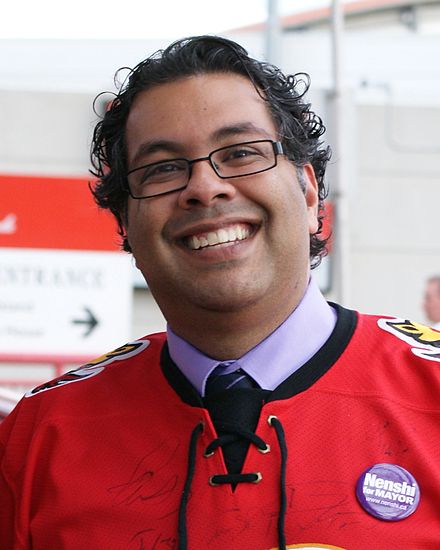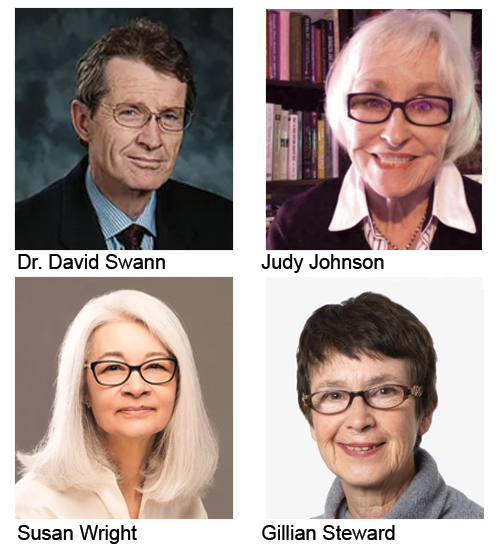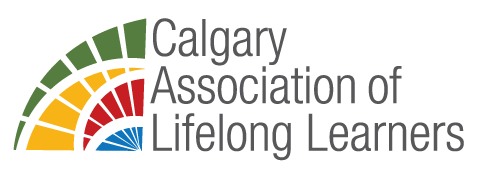|
News From CALL October 2022

Photo by Paul Fesko, a member of the Digital Photography Interest Group
 September Events
September Events
Intergenerational Speaker Series: Former Mayor Nenshi to Speak
Wednesday, September 28 11:00am – 1:00pm, Mount Royal University
We are pleased that former Mayor Nenshi has agreed to be the inaugural speaker at the first event of the Intergenerational Speaker Series. Joining him will be Tim Fox, Vice President of the Calgary Foundation responsible for Indigenous Relations and Equity Strategy. They will be setting the stage for small groups of older adults and university students to discuss personal agency in support of reconciliation. The event entitled Reconciliation: What does it Mean to You will be held at Mt. Royal University from 11am to 1pm on Wednesday September 28. Check the program website for more information and news about upcoming registration.
Registration is not being done through the CALL website but by MRU. Go to their Events page to register.
The Intergenerational Speaker Series (IGSS) is a joint project of CALL and the Nursing Faculty at Mount Royal University funded by the Federal New Horizons Program. We will be offering four informative events in the upcoming year. Each event brings together university students and older adults to give those attending an opportunity to meet and share perspectives on a range of issues common to both groups. IGSS intends to provide participants with the chance to create meaningful relationships, develop skills, obtain knowledge and connect with others outside of their generational demographics.
 October Events
October Events
 Whither Democracy: Egalitarianism or Authoritarianism
Whither Democracy: Egalitarianism or Authoritarianism
Monday, October 3, 1:00 – 3:00pm
cSpace Theatre and by Zoom webinar
An adage notes: A nation’s biggest failure is the failure of creative imagination—the failure to envision and prepare for tragedies such as the 9/11 attack on the world’s strongest democracy. A psychologist, former politician, lawyer, and journalist will creatively imagine how we can preserve and strengthen our democracy—nationally provincially, and locally.
Registration open to CALL members exclusively on September 3; open to the public September 13. Go to the Whither Democracy page.
Science and Environment
Shall We Gather at the River: Irrigation and the Future of Southern Alberta’s Rivers
Tuesday, October 4, 7:30 – 9:30pm. Online on Zoom
Speaker: Lorne Fitch, Retired provincial fish and wildlife biologist and adjunct professor at the U of C.
Southern Alberta’s rivers are at risk, currently, with the present levels of water diversions for irrigation agriculture. The irrigation sector has proposed a “modernization” scheme, funded by nearly a billion dollars of provincial funds, a loan from the Canada Infrastructure Bank and some of their own money. While irrigation efficiency has merits, it appears none of the saved water will remain in our rivers to improve declining aquatic health. It is critical Albertans know what the implications and consequences are if this proceeds, especially without an environmental impact assessment with broad public participation.
For more details and to register go to the Science and Environment page.
Save the Date: The CALL AGM
Monday, October 17, 10:00am by Zoom.
More information and links to registration and meeting documents will be sent to all members’ emails and will be posted on the website soon.
CALL Café: Economics for a Planet in Peril.
Monday, October 24, 2pm – 3:30pm Online with Zoom
The October CALL Café will feature Peter A. Victor, Professor Emeritus, York University. The first president of the Canadian Society of Ecological Economics, Peter is regarded as one of the founders of the discipline of ecological economics. His book, Escape from Overshoot: The Economics of a Planet in Peril will be published in 2023. In his presentation, he will draw on ideas such as ecological economics, degrowth, circular economy, well-being economics, and donut economics, to examine how economics can help us find a way out of the increasing and unsustainable burden on the Earth’s ecological systems.
You must be a CALL member to register but the registration process allows you to bring 1 to 4 guests. If you decide to invite guests after you have registered, you will need to cancel your registration (Cancellation Tips), then register again and indicate the number of guests that you will bring.
To register and for more information, go to the CALL Café: page.
 Interest Groups Welcoming New Members
Interest Groups Welcoming New Members
To see details about Interest Groups that are open for new members, go to the Interest Groups and Study Programs page. Look for groups that indicate ‘Accepting New Members.’
 An Imperfect, Well-Lived Life
An Imperfect, Well-Lived Life
Mondays, October 3 – December 19. Room 310, cSpace, 1721 29 St SW
As we reflect on our own lives, we inevitably question “What is a well-lived life”? The answers will vary but are not as important as the questions. There is no perfect life, that’s why there are many questions.
In the Interest Group, starting October 3, we will examine the ideas about life from philosophers and social commentators past and present. Each member will receive material which makes reference to Zen, Taoism, Buddhism, Alan Watts, Lao Tsu, Krishnamurti, Bach, Thoreau, Emerson and others.
The facilitator, retired high school English teacher Wally Houn, is an avid generalist interested in many areas of the humanities and has been active in music (singing), acting (a member of ACTRA), poetry (studied with Christopher Wiseman and Tim Lilburn), and photography (photos & negatives housed in Provincial Archives).
For more details and to register, go to the An Imperfect, Well-Lived Life page.
 New! Intro to iPhone Photography
New! Intro to iPhone Photography
Saturdays from October 15 – November 12
12:00 noon – 2:00pm. Room 310, cSpace (1721 29 Ave SW)
According to Infotrends, 1.2 trillion digital photos were taken in 2017. Of that number 85% were taken on Smartphones. Join the trend by learning the technology of the native camera for photography and photo editing as well as basic photography and photo editing apps. No special iPhone knowledge or previous experience with iPhone photography needed. Beginners welcome!
Please note that due to the incompatibility of ISO and Android apps, this course is limited to iPhone users.
For more details and to register, go to the Intro to iPhone Photography page.
Film Noir 2022
Thursdays from October 20 – December 1, 2:00 – 4:00pm Online on Zoom
Facilitator: George Melnyk
Group size limited to 25
Film Noir 2022 will be an online experience. The series will be viewable at home. A link, readings and discussion questions will be provided by the facilitator the day before the meeting.
A focus of this Interest Group will be the evolution of this film genre from the mid-forties to the late fifties. We will also be discussing the portrayal of women over this period since several of the films have significant female roles.
George Melnyk previously facilitated Film Noir in 2018, 2019 and 2020 at the Globe Cinema.
For more details and to register go to the Film Noir 2022 page.
World Events Groups 1, 2 &3 – Accepting new members
Each of these groups has a different focus and organization.
World Events Group 1 focuses on international current events and related background issues. They meet Mondays, 1:30 – 3:00pm on Zoom.
For more information go to the World Events Group 1 page.
World Events Group 2 focuses exclusively on current world events and related background issues of a global nature. They meet Wednesdays, 1:00 – 3:00pm at Marda Loop Community Centre, 3130 – 16 Street SW.
For more information and to register go to the World Events Group 2 page.
World Events Group 3 focuses on current world events and International issues. They meet on Fridays, 10:30am – 12:30pm on Zoom.
For more information and to register, go to the World Events Group 3 page.
 CALL Housekeeping Notes
CALL Housekeeping Notes
Would You Like to Contribute to CALL’s Future Success?
by Melvin Pasternak
CALL’s Board of Director’s determines the organization’s future direction and ensures it operates effectively in the present.
The Board meets in-person once a month for approximately two hours. It is a working Board so each member has a specific area of responsibility. The Board is currently seeking four new Chairs: Programming, Volunteers, Membership and Communications.
Detailed descriptions of the roles are available. If you would like to explore the possibility of joining the Board, please contact by email or phone either:
Andy Peters (Nominations Chair) 403-660-6662
Melvin Pasternak (Nominations member) 403-818-7993
Brief descriptions of these positions are below:
Program
The program Chair loves learning and nurturing the development of new courses as well as ensuring existing ones thrive. This person ensures there are Coordinators for the different Interest Group areas and special events. He or she should have good facilitation skills to lead the Program Committee meetings.
Volunteers
The Volunteer Chair is a matchmaker. He or she leads a committee which matches volunteers with the needs of CALL. He or she gathers information on the skills and interests of CALL members so they can be suitably placed in volunteer roles. To accomplish this goal positions are advertised by email or the newsletter.
Membership
The membership chair can speak the language of technology. He or she leads a committee which keeps the database of all CALL members. They help make sure waivers are kept when needed. The membership committee is present at CALL Cafes and lectures if people want to join. They plan activities which help integrate new members into the CALL culture.
Communications
The Communications Chair is a fun position for someone with a flair for writing. The Chair works with a committee that crafts the CALL newsletter, emails to members and posts on social media. This position helps shape the communications policies and directions of CALL.
Volunteer Needed
Tuesday City Walking Group is in need of a Facilitator. We have a dedicated group of enthusiastic Walk Leaders who just need a point person for coordinating the Walking Group members with the walks being offered by the Walk Leaders. Here’s what’s involved:
- The walk leader(s) would send the description of their walk to you.
- You would send a fan out email to the group members with the walks attached.
- The members would email directly to the walk leader of their choice, not you.
Does this volunteer position sound like it's a way you could help out CALL and its members? Love to hear from you, Sue Constable: activities@calgarylifelonglearners.ca
 Jazzing it up at the CALL Café
Jazzing it up at the CALL Café
By Mary Ndlovu, CALL Communications Committee
Photo by Donald Giannatti on Unsplash
 Yes, we held our first in-person CALL Café in more than two years on September 12. No, we didn’t swing and bebop down the aisles at Varsity Presbyterian Church. But we were treated to a fascinating lecture and some demonstrations by Dr Jeremy Brown of the University of Calgary. His presentation, entitled “The Hidden History of Jazz Patronage” provided us a glimpse into the misogynistic world of jazz musicians of the twentieth century. As he put it, “who would have known” that the major early patrons of the musicians, who were mainly black, were the mafia bosses who ran the speakeasys of the prohibition era. And there were other patrons—the women who rescued their men from addiction and depression and helped them build their lives and their careers, and wealthy women such as a Rothschild heiress who kept the entire family of Thelonious Monk in a hotel to give him a home. And did you know the difference between Dixieland, swing and bebop? Dr. Brown demonstrated on his clarinet and saxophone, reminding us of our more youthful days. I’m guessing that many of us went home and started playing some of our favourite jazz music.
Yes, we held our first in-person CALL Café in more than two years on September 12. No, we didn’t swing and bebop down the aisles at Varsity Presbyterian Church. But we were treated to a fascinating lecture and some demonstrations by Dr Jeremy Brown of the University of Calgary. His presentation, entitled “The Hidden History of Jazz Patronage” provided us a glimpse into the misogynistic world of jazz musicians of the twentieth century. As he put it, “who would have known” that the major early patrons of the musicians, who were mainly black, were the mafia bosses who ran the speakeasys of the prohibition era. And there were other patrons—the women who rescued their men from addiction and depression and helped them build their lives and their careers, and wealthy women such as a Rothschild heiress who kept the entire family of Thelonious Monk in a hotel to give him a home. And did you know the difference between Dixieland, swing and bebop? Dr. Brown demonstrated on his clarinet and saxophone, reminding us of our more youthful days. I’m guessing that many of us went home and started playing some of our favourite jazz music.
Dr Brown left us with a spring in our steps and music running through our heads and looking forward to the next CALL Cafe, to be held in October.
 From Our Members
From Our Members
Dust
Story and photo by Fern Phillips
Fern Phillips is a member of CALL's "Our Lives Our Stories" Group 1. She writes beautiful pieces about her childhood on a ranch in the Foothills west of Cochrane. Here she shares one of them. The photo is the view west from the North gravel road mentioned, a view of Ghost River Valley.
 Not a nice road, a gravel road. A chorus of soft country voices recite “Yup, yup, yup” from my childhood memories. I learned early that aspen leaves breathe from the bottom, protected from the layers of dust raised by vehicles on gravel roads, yet a few turn upside down, shrivel and die. They can’t breathe the toxic air.
Not a nice road, a gravel road. A chorus of soft country voices recite “Yup, yup, yup” from my childhood memories. I learned early that aspen leaves breathe from the bottom, protected from the layers of dust raised by vehicles on gravel roads, yet a few turn upside down, shrivel and die. They can’t breathe the toxic air.
Now by comparison, a dirt track produces less dust than a groomed gravel road, vehicles run smoother, in less danger from bullet-like gravel shooting up from tires, the sides stay green because there is less traffic, one can hear the country sounds; but they are good for only the dry and hot summer days. A wet dirt road is a trap for unwary vehicles, sucking at tires like a dog with a soother.
Down a long stretch of dirt trail you’d come across my childhood home, hand built, cheerful and nestled into the forest edge, a window will blink as you drive past, south to Morley. There are two roads south that split on the way while heading south on the reservation. Note that we never use the term that you hear on TV, ‘the Rez”.
The high road is preferred because it is shortest, but sometimes impassible because of spring wash outs, being built on a side hill. The low road is badly maintained and driving over 5 miles an hour shakes the vehicle to pieces, to say nothing of the passengers. It reaches Hwy 1A at the rodeo grounds and we drive east on 1A to the Morley turnoff. We pick up our mail at the Morley Trading Post. These roads on the reservation are clay and mud roads mostly, with less dust than the groomed gravel roads, especially at such low speeds. As we progress towards the highway the road improves with wider shoulders and maintained grooming. By mid-summer the shoulders are brilliant with wildflowers and scented with wild roses.
On the other hand, going north from the house, we cross the Ghost River, using a tiny wooden bridge with uncertain heritage, re-built year after year after the spring flood takes it out. Each year the bridge slants more, making a challenge for the drivers. There are no taxes to pay for a proper repair. The tires almost dip into the clear cold mountain waters.
Make a sharp right turn at the Bar C ranch and you are on the groomed gravel roads of what is now known as Highway 40. Dust hangs in the air for hours and I watch the wind trails from the back of the truck. My brother and I ride in the truck bed of the half ton, enjoying the breeze and happy to be where our parents can’t hear us. We take this road to shop at Cochrane, a town of 700 people or less.
If we need a break from the pounding of the sink holes or a pit stop Dad and Unk (uncle) squat in the dusty road and smoke "roll-m-owns". They smoke the same brand. They spit in the dirt. I spit in the dirt. The talk stops if I come too close, and they grin at me and show me how to squat properly, a squat that can be sustained for hours.
Back at the house, dust hangs in the air around the road out, merges with campfire smoke, and merges again with the evening fog. Carcinogenic particles are present. Time for me to contemplate and introspect while the dead summer air holds and hugs onto trails of air-carried dirt, hiding the path for hours before it settles. It looks like arms reaching out.
Listening to the Wind
By Elaine Strom
A couple stands, embraced
Enduring stance against the wind
Heart on heart in silent oneness
Listening to the wind
Sweeping down from mountains
Over southwest prairie grass
To sandstone at foot of granite
Culminating in lichen-covered cliffs.
Hearing the sound of hooves, the pound of hooves
Downwind, from unsuspecting bison
Now stampeding bison, breathing blood
On a day when forty thousand fell
To the bottom--bodies broken, breath of death.
Subdued, surrounded by spirit of bison
Listening to the wind.
 Your CALL Newsletter
Your CALL Newsletter
The CALL Newsletter is our way to communicate what is going on in our community. It's a way to highlight events of interest, ‘peek behind the curtain of CALL’ and to give some general information about CALL groups and members.
You are invited to send your ideas and suggestions for future issues to newsletter@calgarylifelonglearners.ca. We reserve the right to edit submissions and to determine when submissions will be published.
CALL Newsletter dates for posting:
- October 14/28
- November 11/25
- December 16
- January 13/27
Meanwhile, be well, stay well in every sense of the word.
Please read this disclaimer to be advised of CALL's policy with respect to the endorsement of opinions, products or services associated with CALL programming. Disclaimer | To SEARCH this site, enter keyword in the window below then press the enter key |
